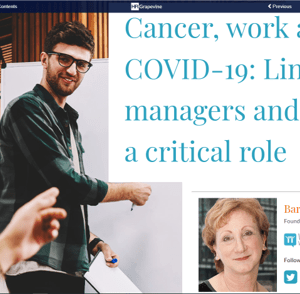Employers/HR/Colleagues

The Importance of Cancer Policies
Posted: 22nd April 2025
This spring the UK government launched an independent review to Keep Britain Working, to review the role of UK employers in creating and maintaining an healthy and inclusive workplace, The figures that have driven this review are startling: “Today there are nearly 800,000 or 40% more people of working-age who are economically inactive for health… [Read More]
How to navigate the transition from cancer treatment to the workplace
Posted: 4th April 2024
An article by our founder, Barbara Wilson, about how to navigate the transition from cancer treatment to the workplace recently appeared in UNLEASH magazine. ‘Cancer isn’t just a concern for individuals, it is also a risk for organizations. More and more people of working age are getting cancer, and it is high time that employers step… [Read More]

Anxiety and returning to work
Posted: 1st August 2023
In this article our Associate Genevie Isaacson, an Employment Lawyer, offers some good practice guidelines for employers to support their employees in making a successful return to work.

Cancer, work and Covid 19: Line managers and HR play a critical role. By Barbara Wilson
Posted: 9th December 2020
….‘These managers, supported and empowered by HR, helped our coachees feel part of the team; they felt reassured, valued, not forgotten, and more in control of their lives. And regaining control over your life after a cancer diagnosis is an important milestone on the road to recovery.’ As one might expect, some people have had… [Read More]

Helping to rebuild and reshape the working lives of those affected by cancer. By Barbara Wilson.
Posted: 9th December 2020
‘………. the critical assumption employers tend to make, a common error, is that they will be dealing with exactly the same person who went off sick some months ago, that they will soon be ‘back to normal’. So, what else can an employer do to support an employee who is still coming to terms with… [Read More]

Going back to work as lockdown relaxes
Posted: 7th May 2020
Employers need to safeguard the health and minimise the risk of infection for all their employees but this is particularly important for those with cancer and their carers, who will be deeply concerned about infecting their vulnerable loved ones. Those with cancer and their carers will typically be nervous about…… To read more click here

One Employer’s approach to lockdown
Posted: 7th May 2020
During the lockdown a number of our clients have done an amazing job in introducing a range of initiatives to support their employees during the lockdown. One of our clients – James Hay – has put in place a number a wide variety of activities which can be done remotely during the lockdown. Some examples… [Read More]

Do your HR policies and processes support employees with cancer?
Posted: 8th February 2018
Successfully managing an employee with cancer will become a far more common experience for line managers, and one of the most challenging. Read this article, written by Barbara Wilson for the HR Zone, about the HR policies and processes employers should put in place to support employees with cancer and ensure that they make a… [Read More]
What is ‘Chemo brain’ – and how can you support an employee who is affected by it?
Posted: 7th December 2017
Chemo brain refers to the cognitive changes that people with cancer may experience before, during and after cancer treatment. These changes may include having trouble with mental tasks related to attention span, thinking, and short-term memory. Many people describe this as a mental fog. The condition is common in cancer patients and survivors, and sometimes… [Read More]

When a colleague has cancer it can impact the whole team. Here are some ways to support them throughout the process
Posted: 7th July 2017
Finding out a colleague has cancer, particularly if you work very closely with them, can be a big shock. Often they are our friends as well as colleagues and the organisation’s focus is very much on supporting the affected employee. This is as it should be, but the impact on the wider team shouldn’t be… [Read More]
